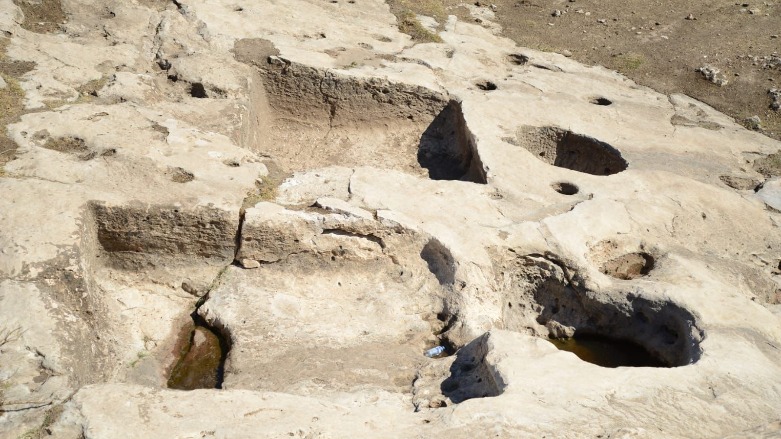Archeologists in Kurdistan Region’s Duhok discover 2,700-year-old wine press

Erbil (Kurdistan 24) – Italian and Kurdish archeologists announced this week that they had identified the remains of a 2,700-year-old wine press in the Kurdistan Region’s province of Duhok that dates back to the Assyrian Empire.
The site, which they say is the oldest such discovery made to date in the northern part of what was ancient Mesopotamia, is located outside the village of New Khanis, some 8 km north of Sheikhan district.
The striking find is the result of a long-term overall survey of archeological sites in Duhok, a joint effort carried out by the Duhok Antiquities Directorate and the Italian university of Udine. It began in 2012 but was interrupted as the COVID-19 pandemic interrupted such programs worldwide last year.
Archaeologists had already established the location as an ancient site of interest, but only after workers returning to the site completed some initial digging and cleaning last month did they realize they were at one of the oldest wineries ever found.

Duhok Director of Antiquities Dr. Bekas Brifkani told Kurdistan 24 that it dates back to the rule of Assyrian King Sennacherib.
He explained that it is carved directly into mountain rock, consisting of 14 reservoirs, with two larger rectangular reservoirs in which ancient laborers would press the juice from grapes, causing it to flow into other circular basins to be collected and stored in jars for fermentation.
Daniele Morandi Bonacossi, Professor of Near Eastern archaeology at the University of Udine and the director of the Kurdistan Region’s Land of Nineveh Archaeological Project, told Reuters, "In the late Assyrian period, between the 8th and the 7th century BC, there was a dramatic increase ... in wine demand and in wine production," described in Assyrian texts that coincides with the age of the site.
"This is a quite unique archaeological finding,” she added, “because it is the first time in northern Mesopotamia that archaeologists are able to identify a wine production area.”

According to Dr. Brifkani, Duhok Antiquities Directorate has just ordered that the location be guarded while archeological teams study how rain and other factors impact the site to establish a plan for how to best protect it until a thorough excavation is completed, at which point it will likely be converted into a future local tourist attraction.
In its joint effort with the University of Udine, the Directorate has so far discovered 1,140 archeological sites in Duhok’s districts of Zakho, Sumel, Sheikhan, and Bardarash, as well as 560 additional sites where it works with other academic institutions that include Germany’s Tübingen and Freiburg Universities.
Editing by John J. Catherine
